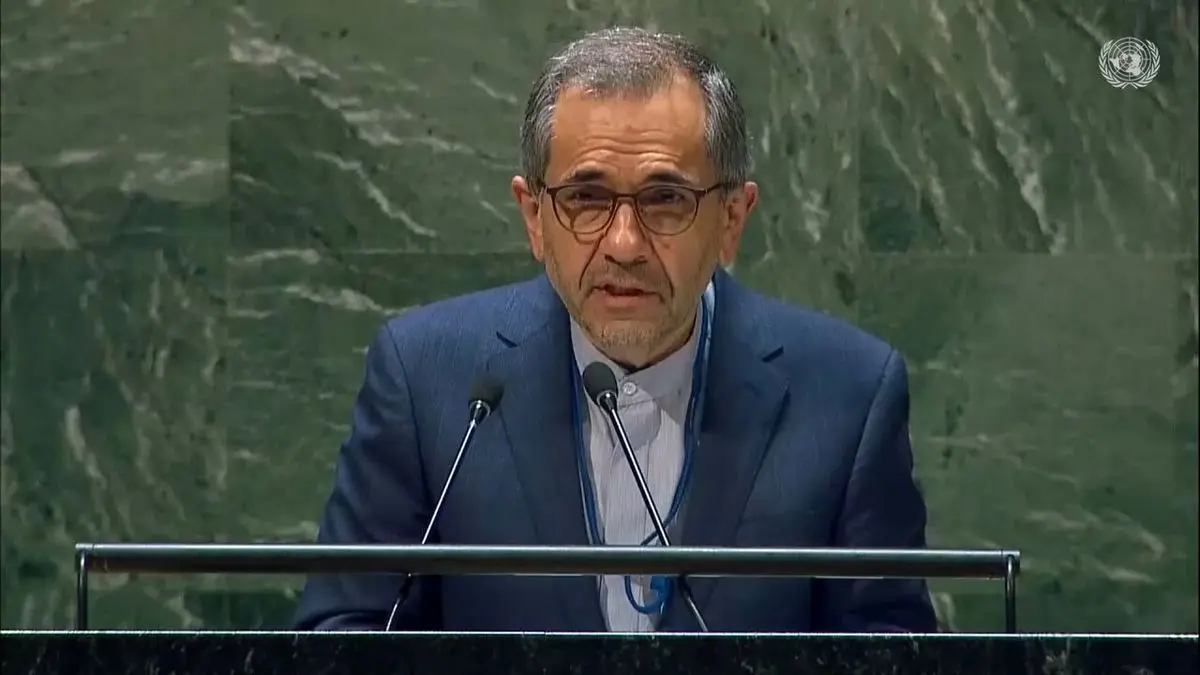Iran calls for removal of unilateral sanctions imposed against Syria

Iranian Ambassador and Permanent Representative to the UN Majid Takht Ravanchi while paying heed to the territorial integrity, independence and political sovereignty of Syria called for removal of unilateral sanctions imposed against Syria.
"Iran's position vis-a-vis Syria's humanitarian issue is completely clear. The Islamic Republic of Iran has always supported the efforts by the United Nations and the international community in helping Syria," Takht Ravanchi said on Thursday addressing a meeting of the UN General Assembly on “Strengthening of the United Nations system - Item 124
Debate pursuant to resolution 76/262”.
The following is the full text of Takht Ravanchi's speech at the UN General Assembly:
Mr. President,
My delegation aligns itself with the statement delivered by the representative of Venezuela on behalf of the Group of Friends in Defense of the United Nations Charter. I would like to make the following in our own national capacity.
In accordance with the principles of independence, humanity, neutrality, and impartiality, Iran has always supported the United Nations and the international community in their efforts to assist Syria.
We have frequently stated that the provision of humanitarian aid to Syria is critical and that political circumstances must not be allowed to prevent aid from reaching people in need. This must be done in a manner that fully respects Syria's political sovereignty, independence, unity, and territorial integrity and in compliance with the purposes and principles of the United Nations Charter.
In line with our consistent position, we have reiterated that the cross-border aid delivery mechanism should be considered as an exceptional and temporary measure imposed by specific circumstances and that humanitarian aid to those in need must be delivered in cooperation and full coordination with the Syrian government and from within the Syrian territory. This will help to prevent the divergence of aid to unintended persons
During the discussions of the issue in the Security Council, my delegation was actively engaged with Penholders of the resolution, the Syrian delegation, and Council members in order to bring this process to a successful conclusion.
We welcome the adoption of Resolution 2642 (2022) and consider it a crucial step toward addressing Syria's urgent needs. In this regard, we would like to highlight the following points;
1- While the resolution extends the cross-border mechanism for a period of six months, it also sets out explicit demands for early recovery projects and increased transparency in relief efforts. The resolution underlines the critical need to increase cross-line delivery throughout Syria. In this context, we call on all parties to carefully adhere to the basic principles governing humanitarian assistance, as well as to ensure neutrality and transparency.
2- We demand the lifting of unilateral sanctions against Syria, which impede the implementation of the Resolution. In this context, the implementation of early recovery projects such as electricity, which are critical to restoring access to basic services, must not be affected by unilateral sanctions. These illegal measures also stymie Syria's reconstruction efforts and humanitarian relief delivery in a variety of ways, even delaying the return of refugees and displaced persons. In this connection, we call for the removal of sanctions in the context of the ongoing COVID-19 pandemic.
3- Resolution 2642 requests the Secretary-General to provide a special report on the humanitarian needs in Syria. The report should include overall trends related to unhindered and safe United Nations cross-line operations which should reach all parts of Syria, early recovery projects, and detailed information on the humanitarian assistance delivered through United Nations humanitarian cross-border operations, including their transparency, the distribution mechanism, the number of beneficiaries, operating partners, locations of aid deliveries at district-level and the volume and nature of items delivered;
4- And finally, the resolution encourages the convening of a Security Council Informal Interactive Dialogue in order to regularly review and follow up on the implementation of this resolution, including progress in early-recovery projects. We believe that through this mechanism, the Council will be able to monitor progress in the effective and balanced implementation of the resolution.
